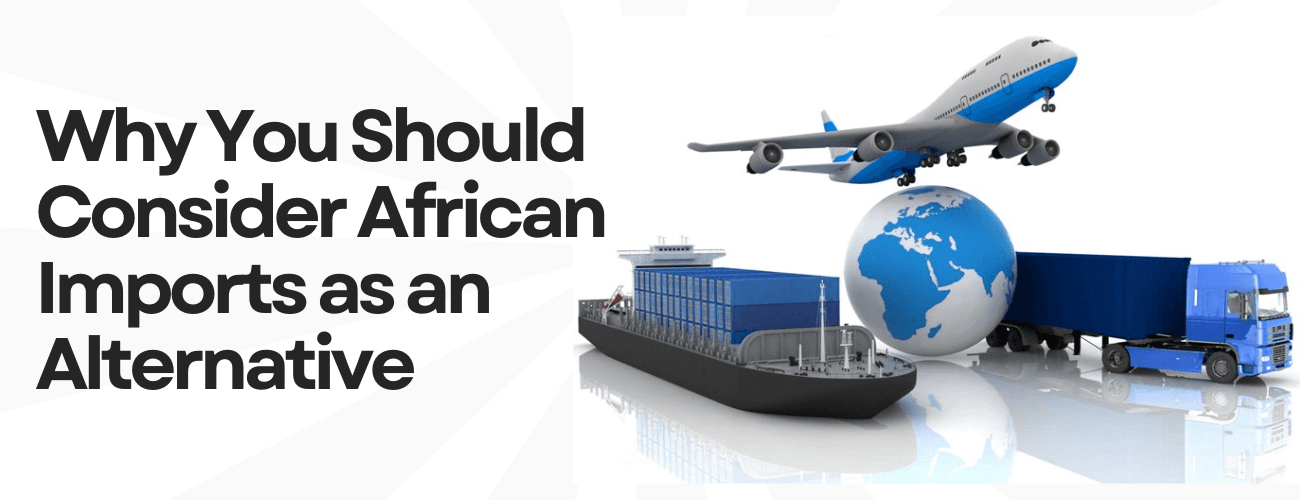
3 min read
Kehinde
Manager, Product Marketing
Every year, African businesses spend billions importing raw materials, packaging, and machinery from Europe and China.
For many, it’s simply “how business is done.”
But what if the product you are looking for isn’t 10,000 kilometres away but right here on the continent?
Across Africa, a quiet shift is underway. Businesses are beginning to source for their products from within, building trade connections between Ghana, Nigeria, Algeria, Egypt, Kenya, Tanzania, South Africa and so on.
And with AfCFTA opening up a $3.4 trillion single market, this shift from importing from China to trading within Africa could be the game-changer that reshapes the continent’s industrialisation.
Importing from nearby African countries dramatically cuts freight costs and delivery times.
Instead of waiting 60–90 days for shipments from China or Europe, African businesses can receive materials within days or weeks from regional suppliers.
This proximity also reduces the risks of shipment delays, fluctuating exchange rates, and port congestion common issues when trading with overseas markets.
The African Continental Free Trade Area (AfCFTA) is transforming how African businesses trade with one another. By reducing tariffs, harmonizing customs procedures, and promoting cross-border trade across 54 nations, AfCFTA is unlocking a $3.4 trillion single market.
This means importing from South Africa to Nigeria, or from Kenya to Egypt, is now easier, cheaper, and more transparent than ever before.
For procurement managers, it’s a real opportunity to rethink sourcing strategies and take advantage of a growing network of intra-African suppliers.
Africa’s industrial base is evolving really fast. Countries like South Africa, Egypt, Morocco, Kenya, Nigeria, and Ghana are expanding production in key sectors from packaging and agro-processing to chemicals, textiles, and even machinery.
This growth means African buyers no longer have to look outside the continent for quality or scale. The products are here.
Truth be told, the challenge isn’t availability; it’s visibility, that is, knowing where to find the right suppliers and how to transact seamlessly.
And that’s exactly what Brydge was built to solve, help African businesses find the right product within Africa .
Every intra-African trade transaction does more than fulfil a business order, it fuels shared prosperity. When manufacturers choose to source within Africa, they help sustain regional industries, create jobs, and keep more value circulating on the continent.
In other words, choosing an African supplier doesn’t just make sense commercially but it makes sense economically.
It’s how we build stronger local ecosystems and a more self-reliant Africa economy.
If the past few years have taught us anything, it’s that global supply chains are fragile. Pandemics, trade tensions, and volatile shipping rates can disrupt months of planning in a heartbeat.
By sourcing closer to home, African businesses gain control and flexibility. Shorter routes mean fewer uncertainties and faster recovery when disruptions happen.
At Brydge, we make it easier for African businesses to source and trade within the continent — reducing overdependence on overseas markets and strengthening Africa’s internal supply chains.
Here’s how we help:
Discover and connect with trusted, pre-vetted suppliers and manufacturers across Africa from raw materials to finished goods all in one place.
We help you navigate AfCFTA trade processes, documentation, and compliance requirements making cross-border trade smoother and faster.
From creating and sending RFQs to comparing quotes and automating approvals with existing and new suppliers, Brydge streamlines your entire procurement workflow digitally.
Handle cross-border payments, shipments, and supplier communication from a single dashboard without extra cost or man power.
While China and Europe will continue to play a major role in global trade, Africa’s emerging manufacturing strength and unified trade frameworks under AfCTA are reshaping the future of trade in Africa.
For African businesses, the opportunity is clear, source and trade within the continent to grow the African economy.
By trading within the continent, businesses can cut costs, reduce risks, and contribute to a more resilient African supply chain.
Brydge is making that shift possible, helping companies digitize procurement, connect with verified suppliers, and manage cross-border trade seamlessly across Africa.